June 17, 2025 | 03:17 GMT +7
June 17, 2025 | 03:17 GMT +7
Hotline: 0913.378.918
June 17, 2025 | 03:17 GMT +7
Hotline: 0913.378.918
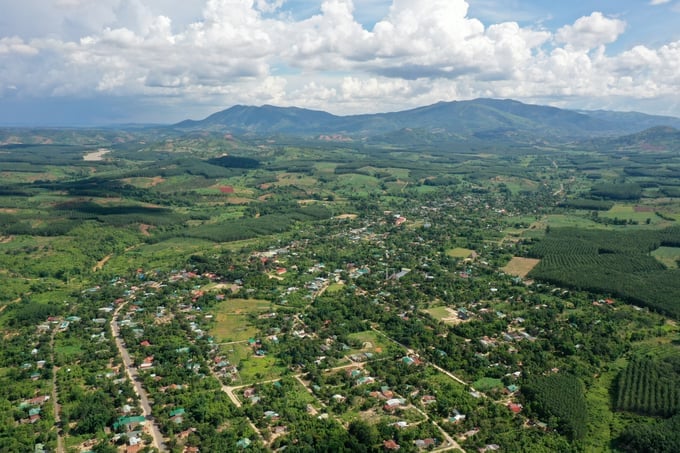
The general rule of the EUDR is that only products that are not causing deforestation and are legal are permitted for export to the EU. Photo: Tung Dinh.
The European Union's Deforestation Regulation (EUDR) was issued to prohibit products and commodities that cause deforestation, forest degradation, and do not comply with the laws of the country of harvest from being imported into or exported from the EU market.
This regulation was introduced at the end of May 2023 and took effect on June 29, 2023, with an implementation deadline for EU importers and exporters set for December 2024, and for small businesses from June 2025.
The general rule of the EUDR is that only products that do not cause deforestation and are legally sourced are permitted to be exported to or imported from the EU. Additionally, there are strict traceability requirements for goods and the land on which they are produced.
The goal of the EUDR is to minimize the involvement of European countries in global deforestation and forest degradation, thereby contributing to the reduction of deforestation. Moreover, the EUDR also aims to help reduce greenhouse gas emissions and the global decline in biodiversity.
This means that only products that do not cause deforestation and have clear and complete legal documentation can be exported to Europe. Additionally, there must be a transparent database system in place to trace the origin of the products and the land on which they were produced.
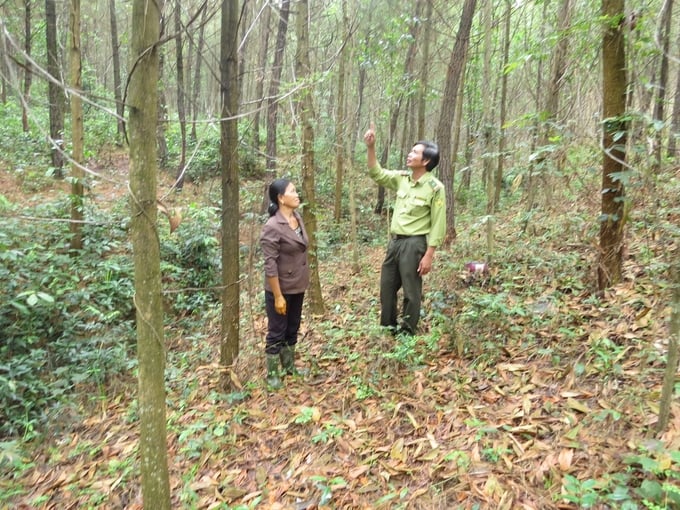
The regulations of the EUDR and Vietnam's National Forest Certification System share certain similarities. Photo: NNVN.
According to assessments by Vietnamese specialized agencies, six groups of products will be affected when the EUDR regulation is officially applied. The first group includes wood products such as paper, cardboard, wood fibers or wood, printed materials, charcoal products, wood pulp, and various types of chairs.
Next are products related to rubber trees, coffee, and cocoa. Additionally, livestock products such as beef and crops such as soybeans will also be affected by the EUDR.
The European Union Deforestation Regulation (EUDR) has three key points: goods must not be produced from materials causing deforestation or forest degradation after December 31, 2020; production must comply with the laws of the country of origin; there must be geolocation information for the harvested areas; and a due diligence system must be in place to prove compliance with the laws of the country of origin.
Meanwhile, the National Forest Certification System was established by the Ministry of Agriculture and Rural Development in 2019 based on the Prime Minister’s Decision No. 1288/QD-TTg in 2018. There are two main standard groups applied for production: the Sustainable Forest Management Standard (VFCS/PEFC) and the Product Chain of Custody Standard (PEFC CoC).
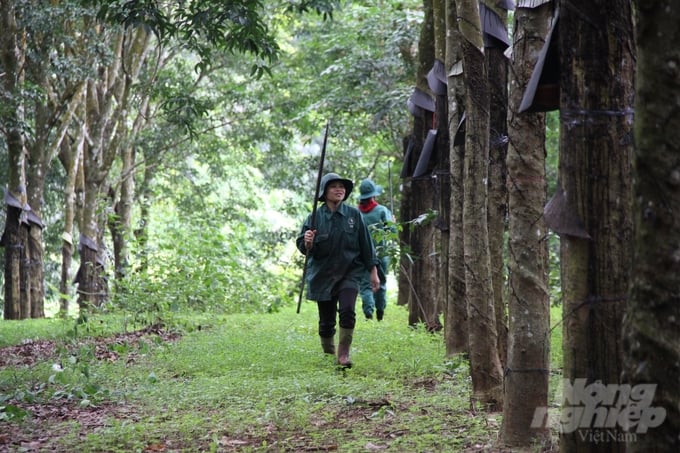
Forests certified with sustainable forest management will be a crucial foundation to meet the requirements of the EUDR. Photo: NNVN.
Therefore, the sustainable forest management standards are developed based on the practical conditions of Vietnam and the regulations of Vietnamese law, so basically, wood products certified with VFCS/PEFC FM will meet the requirement that goods must be produced in compliance with the laws of the country of origin according to the EUDR.
Additionally, when developing a sustainable forest management plan (a requirement of the sustainable forest management standards), forest owners have established maps, including geolocation information of forest plots. This serves as the basis to meet the EUDR requirement (geolocation information for harvested areas).
The first requirement in the VFCS/PEFC sustainable forest management standards is that forest owners must have evidence of legal land use rights. Therefore, areas used for improper purposes or encroaching on natural forests are thoroughly reviewed to be excluded from the certified areas.
Currently, the government has had a policy to close natural forests since 2014, so timber harvested in our country is mainly from plantation forests. Therefore, wood certified under VFCS/PEFC basically meets the EUDR requirement (goods must not be produced from materials causing deforestation or forest degradation after December 31, 2020).
Furthermore, when wood materials enter factories certified with the PEFC CoC chain of custody, they must undergo a due diligence system (DDS) declaration process.
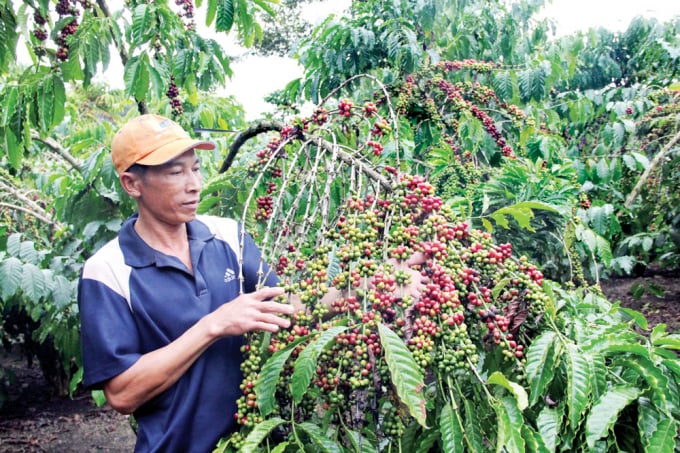
In addition to the forestry sector, certain products such as coffee also fall under the requirement to meet EUDR standards. Photo: NNVN.
Currently, PEFC has completed the development of the Annex on Verification of Due Diligence Requirements (EUDR), and the draft has completed the process of gathering feedback from the international community. It will soon be officially issued in the near future. When that happens, VFCS/PEFC certification will also include the requirements of EUDR. As a result, products certified under the national forest certification system will also meet the conditions of EUDR (having a due diligence system to demonstrate compliance with the laws of the country of origin).
From these factors, it can be seen that the requirements of EUDR will all be met by the National Forest Certification System. Thus, forest areas that meet the standards of the National Forest Certification System will have the basic foundations to also meet EUDR requirements.
According to Mr. Nguyen Hoang Tiep, Deputy Director of the Vietnam Forestry Certification Office (VFCO), timber and non-timber forest products harvested from VFCS/PEFC certified forests will essentially meet the EUDR requirements. This is also the raw material source that many experts recommend using to meet EUDR requirements.
It can be seen that the deadline for applying EUDR is fast approaching (1/1/2025), while many other forest owners are not yet ready. The forest owners with sustainable forest management certification will have a great opportunity to expand their market.
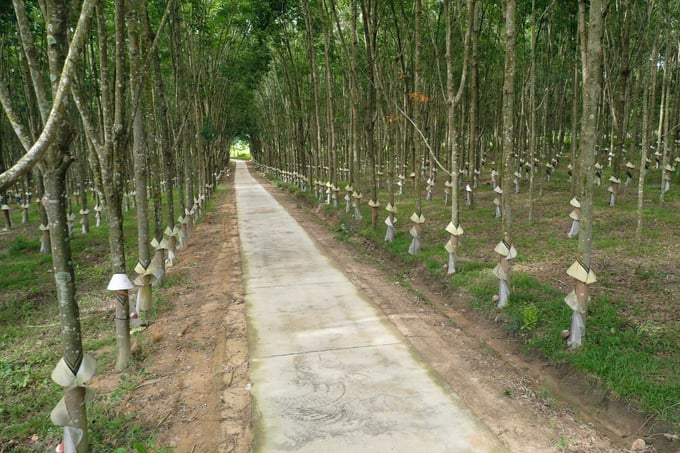
Vietnam Rubber Group is one of the entities actively engaging in early activities to adapt to the EUDR. Photo: Tung Dinh.
In this context, to meet the requirements of the EUDR, as the operating body of the National Forest Certification System, VFCO has been actively preparing to adapt to the EUDR. This includes reviewing pilot provisions of the EUDR with rubber industry products, reviewing infrastructure to incorporate additional requirements related to the EUDR into the VFCS/PEFC FM sustainable forest management standards. Additionally, VFCO participates in PEFC working groups to develop documents and guidance for adapting to the EUDR. The office is also preparing guidelines for forest owners and businesses to adapt to the EUDR.
Mr. Nguyen Hoang Tiep said that in the time to come, when PEFC issues the Annex on the Assurance System requirements for EUDR, the VFCS Office will disseminate, guide and train enterprises to use and meet the EUDR requirements.
Recently, the Vietnam Rubber Industry Group (VRG) coordinated with the Vietnam Forestry Science Institute and the VFCS Office to organize a workshop on "Developing an action plan to adapt to EUDR regulations".
The workshop discussed and agreed to be ready to implement EUDR through establishing an EUDR DDS, building capacity, and implementing PEFC EUDR certification in the national forest certification system (VFCS/PEFC).
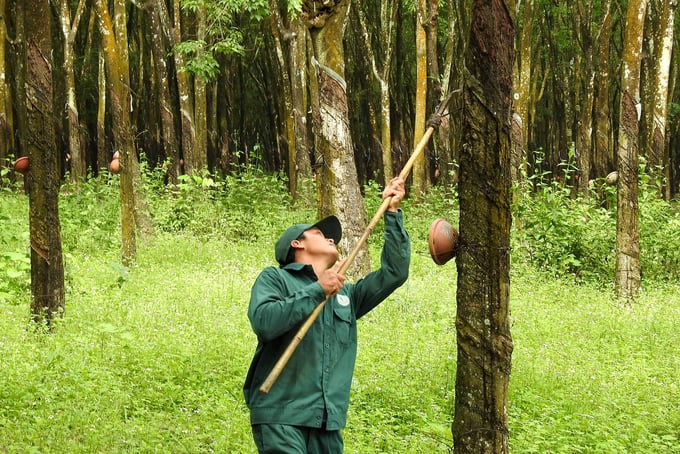
The rubber industry has prepared the necessary conditions to meet the requirements of the EUDR. Photo: NNVN.
VFCO will continue to closely collaborate with PEFC and VRG to promote sustainable rubber industry development through the implementation of sustainable forest management certification, product chain of custody (CoC) linked with the PEFC EUDR Due Diligence System (PEFC EUDR DDS).
It is known that green growth and sustainable development strategy are crucial principles for VRG, aiming to simultaneously achieve three goals: economic development, environmental protection, and responsibility to the community and society.
Regarding the supply chain, VRG aims by 2030 to have 60% of its rubber and plantation forests certified under VFCS/PEFC sustainable forest management, and 100% of its rubber processing factories certified with product chain of custody.
By 2050, VRG aims for 100% of its rubber and plantation forests to be certified under VFCS/PEFC sustainable forest management, and 100% of its production facilities (rubber latex, timber, rubber industrial products, etc.) to have product chain of custody certification.
Translated by Mai Quang Huy

(VAN) The working delegation from the Ministry of Agriculture and Environment conducted an important trip to the Netherlands to strengthen strategic partnerships and sustainable development in the agricultural sector.

(VAN) The letter ‘A Plea from the Ocean’ not only evokes emotion but also awakens the human conscience to the responsibility of protecting life on Earth.

(VAN) The Department of Agriculture in South Africa has announced the country’s first mass vaccination of poultry to prevent local birds from contracting avian influenza.

(VAN) Establishment of the Mekong Delta Regional Agricultural Linkage Center, aiming for a closed value chain, deep processing, trading platforms, and international market connectivity.

(VAN) Gia Lai province has recently recorded 460 rare species of animals and plants, contributing to forest conservation and biodiversity planning in the region.

(VAN) Ms. Caroline Beresford, New Zealand Ambassador to Vietnam, expressed confidence that agricultural cooperation between Vietnam and New Zealand will develop sustainably, be climate-resilient, and promote gender equality.

(VAN) Vietnam reaffirms its commitment to international cooperation in fostering sustainable and responsible fisheries while ensuring resilient livelihoods for small-scale fishing communities.